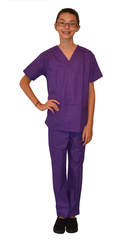
Pretend Play with Kids Scrubs
Kids scrubs are a great way for children to learn and have fun at the same time! Research has found that imaginative play influences a child's developing creativity, social skills, and ability to understand others. When children are encouraged to role play, they are able to explore new horizons and ideas beyond what is already familiar to them. Teachers and parents can stimulate this beneficial play by providing children with a variety of props and costumes. Adding kids scrubs or a pretend doctor kit to a play area may introduce new and exciting possibilities for learning and growth. Pretend doctor play might alleviate fears that children have about visiting the doctor. This can be helpful for healthy children who see their doctor infrequently or only for well-visits, but even more valuable for children with serious health conditions. Giving children the means to work through their fears or past difficult experiences can be emotionally empowering and increase their sense of independence. Pretending to be a doctor or nurse may even interest a child in the field of medicine as a future career. Taking a stuffed animal’s temperature may seem trivial to an adult, but it can be a powerful expression of a child’s hopes or dreams! When children have tools and props like a stethoscope, and clothes, like kids scrubs, that look authentic, they feel encouraged and supported in their interests. Whether they pursue the study of medicine or not, pretend doctor play will help children develop empathy as they care for their patients and work to heal them. It will give them opportunities for language development as they describe the action and setting of their play. Today, they may be setting a broken bone, but tomorrow, extensive surgery may be needed! Adults are often surprised at how well children collect vocabulary and knowledge in an area of interest. Though pretend play is enriching even when a child plays alone, when a child engages in pretend play with peers, they get the chance to practice social skills such as turn taking, listening, sharing, and cooperation. A child’s very own set of scrubs will not only bring a smile to their face, but can provide an incredibly rich opportunity for social, emotional and intellectual development through pretend play.
Kids scrubs are a great way for children to learn and have fun at the same time! Research has found that imaginative play influences a child's developing creativity, social skills, and ability to understand others. When children are encouraged to role play, they are able to explore new horizons and ideas beyond what is already familiar to them. Teachers and parents can stimulate this beneficial play by providing children with a variety of props and costumes. Adding kids scrubs or a pretend doctor kit to a play area may introduce new and exciting possibilities for learning and growth. Pretend doctor play might alleviate fears that children have about visiting the doctor. This can be helpful for healthy children who see their doctor infrequently or only for well-visits, but even more valuable for children with serious health conditions. Giving children the means to work through their fears or past difficult experiences can be emotionally empowering and increase their sense of independence. Pretending to be a doctor or nurse may even interest a child in the field of medicine as a future career. Taking a stuffed animal’s temperature may seem trivial to an adult, but it can be a powerful expression of a child’s hopes or dreams! When children have tools and props like a stethoscope, and clothes, like kids scrubs, that look authentic, they feel encouraged and supported in their interests. Whether they pursue the study of medicine or not, pretend doctor play will help children develop empathy as they care for their patients and work to heal them. It will give them opportunities for language development as they describe the action and setting of their play. Today, they may be setting a broken bone, but tomorrow, extensive surgery may be needed! Adults are often surprised at how well children collect vocabulary and knowledge in an area of interest. Though pretend play is enriching even when a child plays alone, when a child engages in pretend play with peers, they get the chance to practice social skills such as turn taking, listening, sharing, and cooperation. A child’s very own set of scrubs will not only bring a smile to their face, but can provide an incredibly rich opportunity for social, emotional and intellectual development through pretend play.
|
|
|
|
|
|
|
|
|
|
|























